
In Greek mythology, Phaedra ; was a Cretan princess. Her name derives from the Greek word φαιδρός, which means "bright". According to legend, she was the daughter of Minos and Pasiphaë, and the wife of Theseus. Phaedra fell in love with her stepson Hippolytus. After he rejected her advances, she accused him of trying to rape her, causing Theseus to pray to Poseidon to kill Hippolytus, and then she killed herself.

Topkapi is a 1964 American Technicolor heist film produced by Filmways Pictures and distributed by United Artists. The film was produced and directed by the émigré American film director Jules Dassin. The film is based on Eric Ambler's novel The Light of Day (1962), adapted as a screenplay by Monja Danischewsky.
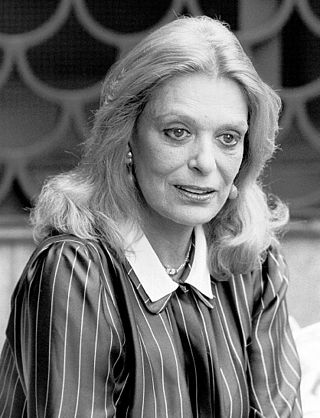
Maria Amalia "Melina" Mercouri was a Greek actress, singer, activist, and politician. She came from a political family that was prominent over multiple generations. She received an Academy Award nomination and won a Cannes Film Festival Best Actress Award for her performance in the film Never on Sunday (1960). Mercouri was also nominated for one Tony Award, three Golden Globes and two BAFTA Awards in her acting career. In 1987 she was awarded a special prize in the first edition of the Europe Theatre Prize.
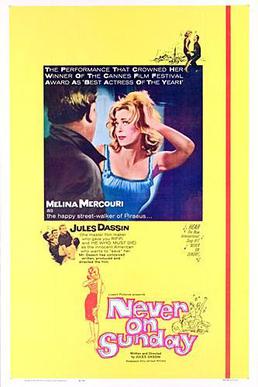
Never on Sunday is a 1960 Greek romantic comedy film starring, written by and directed by Jules Dassin.

Joseph Ira Dassin was an American–French singer-songwriter. In his career spanning sixteen years (1964–1980), he enjoyed numerous successes in France and the French-speaking world, as well as singing in languages other than French. He had a career in Soviet Union, Finland, Greece, and Germany. In total, he sold nearly 25 million records worldwide. He was the son of film director Jules Dassin.

Stella is a 1955 Greek film is a retelling of Carmen featuring Melina Mercouri. The film was directed by the Greek Cypriot Michael Cacoyannis and written by Cacoyannis and Iakovos Kambanelis. The music was composed by Manos Hadjidakis and Vassilis Tsitsanis.

Julius "Jules" Dassin was an American film and theatre director, producer, writer and actor. A subject of the Hollywood blacklist, he subsequently moved to France, and later Greece, where he continued his career. He was a member of the Academy of Motion Picture Arts and Sciences and the Screen Directors' Guild.
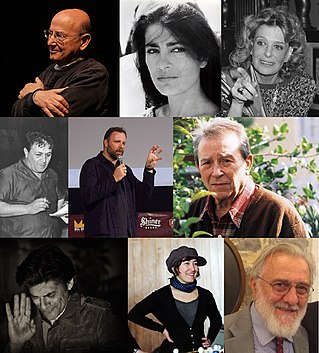
The cinema of Greece has a long and rich history. Though hampered at times by war or political instability, the Greek film industry dominates the domestic market and has experienced international success. Characteristics of Greek cinema include a dynamic plot, strong character development and erotic themes. Two Greek films, Missing (1982) and Eternity and a Day (1998), have won the Palme d'Or at the Cannes Film Festival. Five Greek films have received nominations for the Academy Award for Best Foreign Language Film.
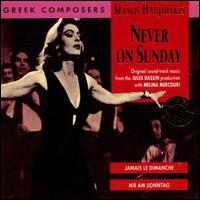
"Never on Sunday", also known by its original Greek title "Ta Pediá tou Pireá", is a song written by Manos Hatzidakis and first sung by Melina Mercouri in the film of the same name, directed by Jules Dassin and starring Mercouri. The song won the Academy Award for Best Original Song in 1960, a first for a foreign-language picture. The film score was first released on 1 October 1960 by United Artists Records.

GiorgosArvanitis is a Greek cinematographer.

Illya Darling is a musical with a book by Jules Dassin, music by Manos Hadjidakis, and lyrics by Joe Darion, based on Dassin's 1960 film Never on Sunday.
Nikos Kourkoulos was a Greek theatrical and film actor. Kourkoulos is best known to Greek audiences for playing "Angelos Kreouzis" in Oratotis miden, but he also appeared in other movies such as To Homa vaftike kokkino, Exodos kindynou, O Astrapogiannos, O Katiforos among others.
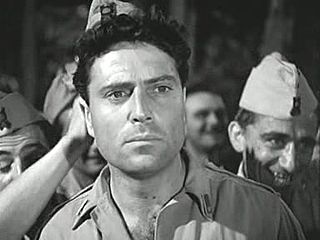
Raffaele Vallone was an Italian actor and footballer. One of the top male Italian stars of the 1950s and 1960s, he first became known for his association with the neorealist movement, and found success in several international productions. On stage, he was closely associated with the works of Arthur Miller. He played the role of Eddie Carbone in A View from the Bridge several times, including Sidney Lumet's 1962 film adaptation, for which he won the David di Donatello for Best Actor.

He Who Must Die is a 1957 French-Italian film directed by Jules Dassin. It is based on the novel Christ Recrucified by Nikos Kazantzakis. It was entered into the 1957 Cannes Film Festival.

The Law is a 1959 French-Italian film directed by Jules Dassin.

A Dream of Passion is a 1978 Greek drama film directed by Jules Dassin. The story follows Melina Mercouri as Maya, an actress playing Medea, who seeks out Brenda Collins, portrayed by Ellen Burstyn, a woman who is in jail for murdering her own children to punish her husband for his infidelity.
The 16th British Academy Film Awards, given by the British Academy of Film and Television Arts in 1963, honoured the best films of 1962.

The 34th annual Berlin International Film Festival was held from 17–28 February 1984. The festival opened with The Noah's Ark Principle by Roland Emmerich. The retrospective was dedicated to German-American actor, screenwriter, producer and film director Ernst Lubitsch.

Despoina "Despo" Diamantidou was a Greek actress. She appeared in more than seventy films from 1949 to 2003, frequently in support of Melina Mercouri and directed four times by Jules Dassin.

















